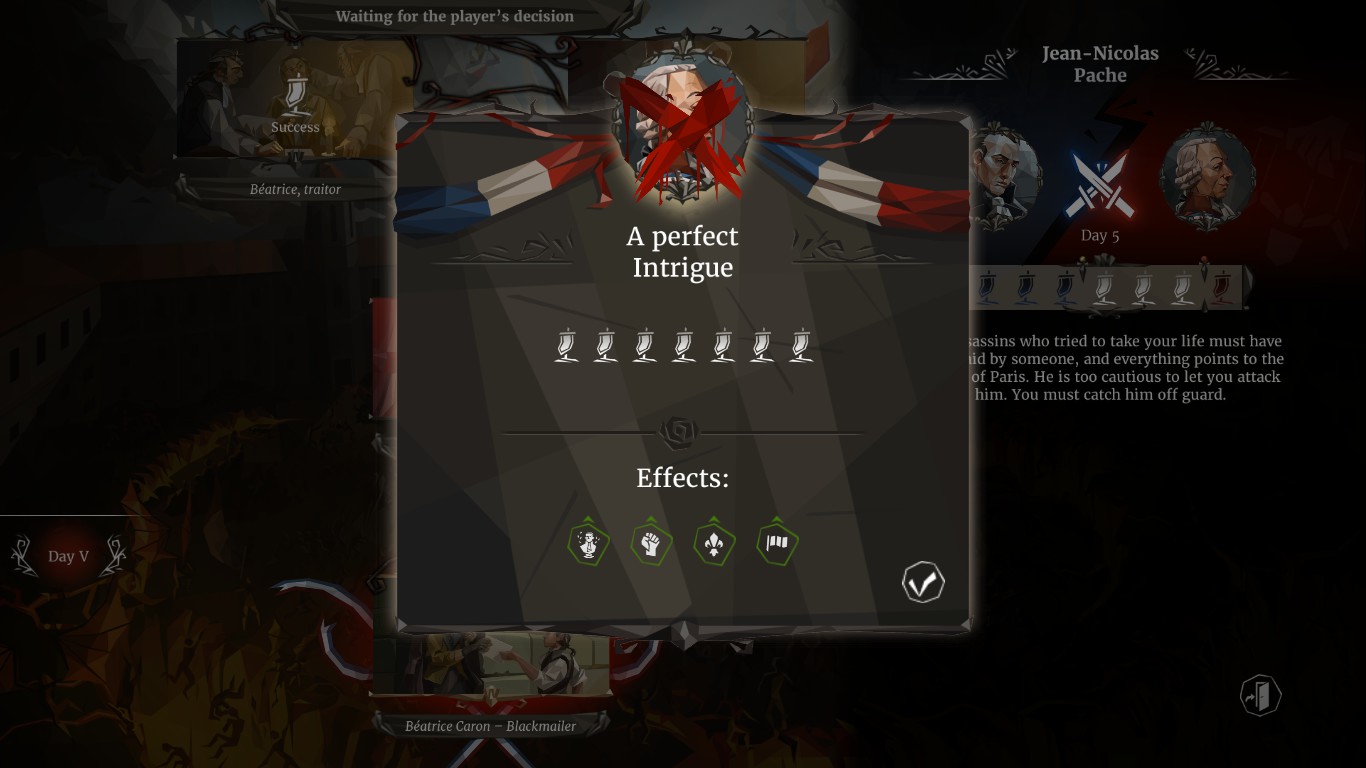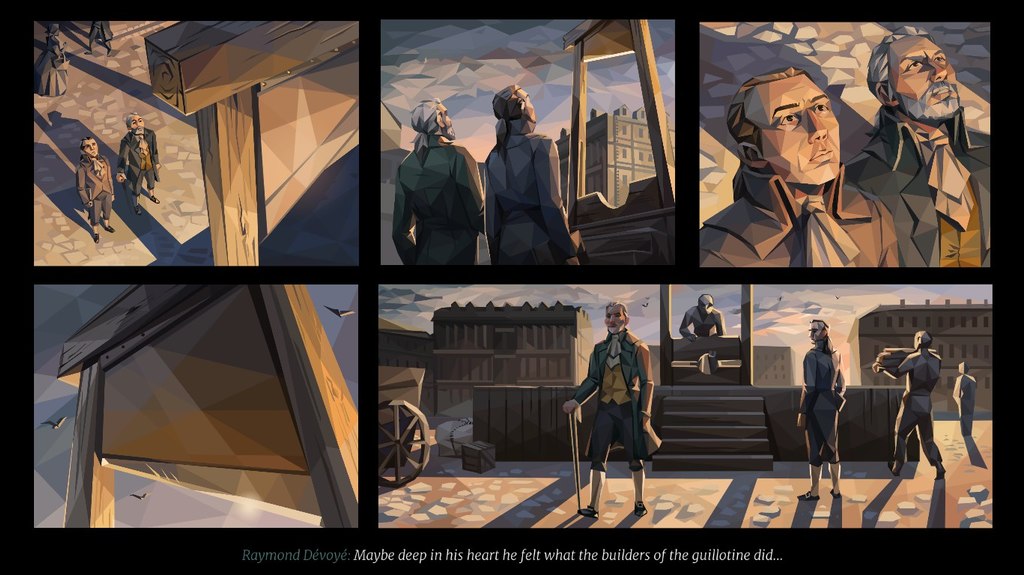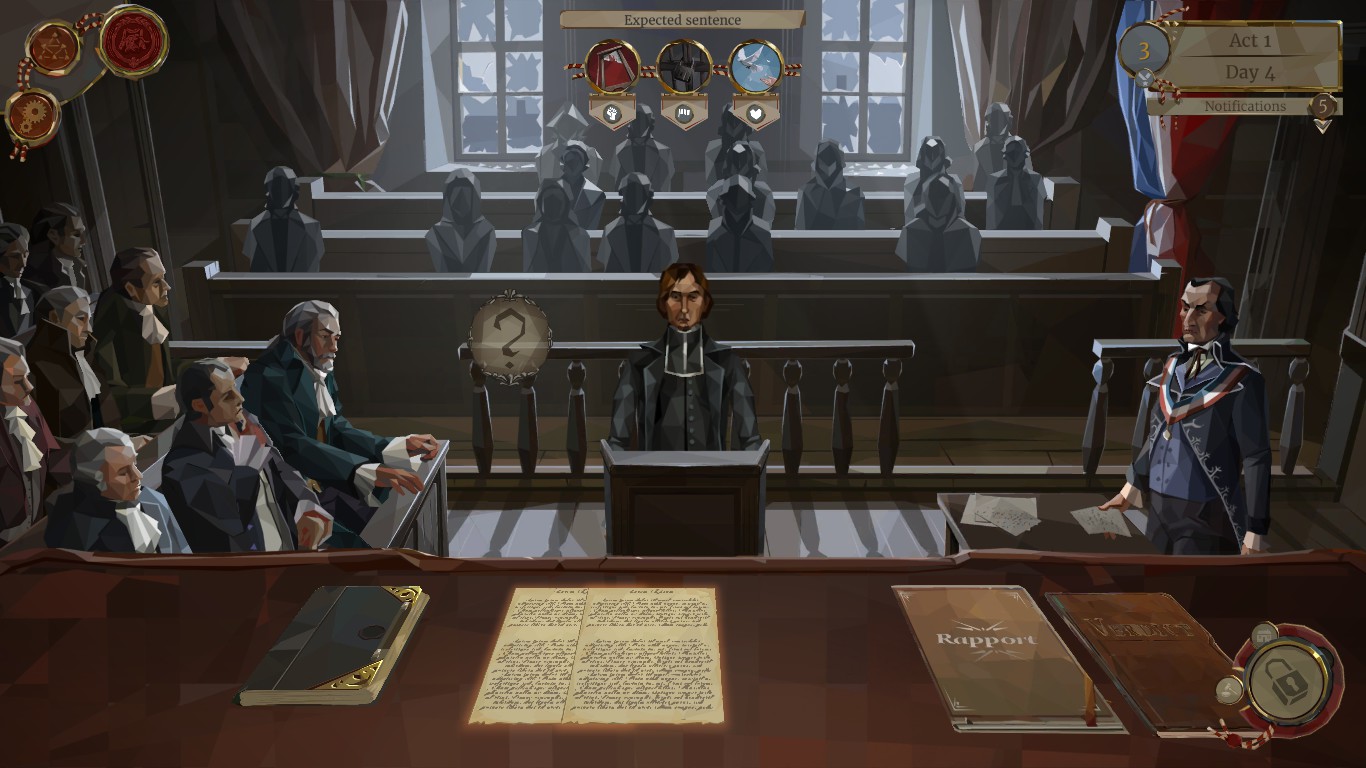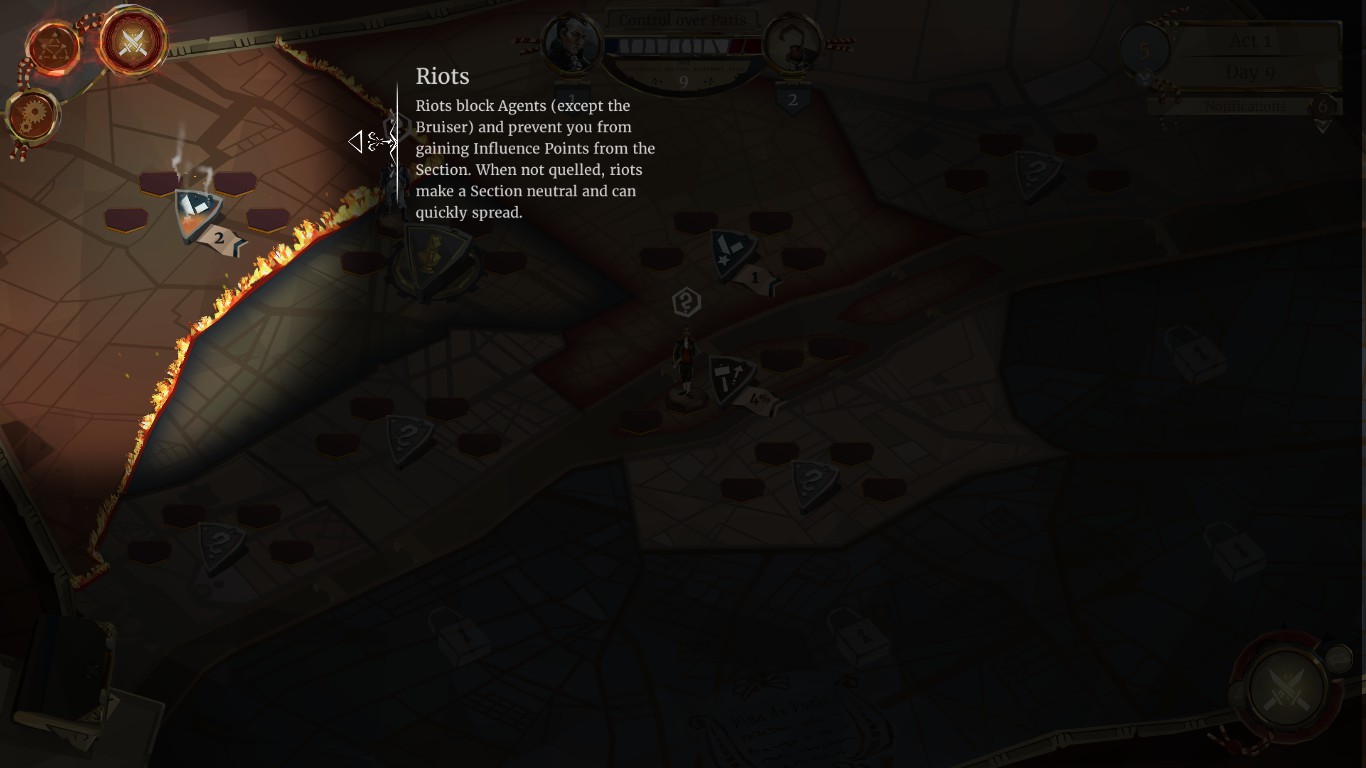They say you can’t please everyone all of the time, and “they” have clearly been playing We. The Revolution.
The latest release from independent studio Polyslash, We. The Revolution puts you in the shoes of Alexis Fidèle, a judge during the French Revolution. You’re tasked with hearing cases and deciding the fates of a series of ne’er do wells, hooligans and, frankly, rather innocent sounding citizens.
No one is safe from a date before your bench. Some cases feature common folk who are just trying to have a laugh, while others feature the French royalty, King Louis XVI and Marie Antoinette.
On its face, We. The Revolution is a relatively simple premise. You read over basic court documents and use them to identify potential lines of questioning. Once you have done your research, a clue-finding mini-game lets you use the information to locate the connections you need in order to unlock questions pertinent to the case.
Using the questions, you can begin to piece out the case and come to a conclusion. Set the defendant free, sentence them to jail, or have their head. The decision is yours.
But if it was only that simple.
If there is one theme which runs throughout We. The Revolution, it’s that there is always more than meets the eye. From the particulars of the cases and intrigues before you to the mechanics of the game itself, rarely is We. The Revolution entirely devoid of at least a little bit of uncertainty.
The Delicate Balance of Politics in a Revolution
The first place you’ll notice that things are not so straightforward is in the sentencing process. Things aren’t as cut and dry as simply finding out if the defendant actually did what they’re accused of and then ruling accordingly.
France is in turmoil, and the warring factions all have their own wants and desires from your judge. Your family, the commoners, the revolutionaries, and the aristocracy all have their own opinions on what should and should not be happening in your courtroom — and you shouldn’t count on them agreeing.
While each ruling is not always a direct trade-off, where you gain as much from one party as another, there are always pros and cons to every option. Doing the “right” thing doesn’t immunize you from ill will from parties who oppose your decision, and keeping those parties happy is important. Push one a little bit too far and it may be your neck lined up beneath the blade next.
If that wasn’t tricky enough, there’s also the jury and your case reports to worry about. Each case comes with a series of questions your superiors want answered regarding its particulars. Then, each is heard before a jury with its own opinions of the accused’s guilt.
You don’t have to listen to the jury at the end of the day, but failing to do so comes with a cost in the form of your damaged reputation with all parties.
All of this comes together to create an interesting blend of factors to measure.
I approached the game with a general view of being a man of the little people. Then I ruled against the Revolutionaries once too often and lost my head. Armed with the knowledge that a faction on the brink cannot be ignored, I progressed on, always being sure to rule in favor of anyone making a direct threat on my life. Priorities.
From there, everything went smoothly until a case required me to find a judgment which was severely lacking in supporting details.
Every question you unlock shows if it will move the jury toward a verdict of freedom or death, and I had only a few questions open to me if I wanted the jury on my side, and my head on my shoulders. None of them answered the questions in my report. Suddenly, I was faced with many choices, and none of them were good.
Ask the questions and then ignore the jury, and lose face with the people? Hand in a poor report and earn a reputation as a judge who doesn’t care? Upset the revolutionaries? No thanks, I’d seen that last play before.
Ultimately, I opted to get the jury to agree with what the Revolutionaries wanted to see, then wing it on my report. I still am not sure if that was the best decision, and that’s why We. The Revolution is so intriguing.
More Systems Lurk Beneath the Surface
Just as each case in the court has hidden depths of strategy to consider, the game also unfolds an ever-growing series of interlocking systems to manage the further you progress.
Shortly after you wrap up your first case, you are introduced to the judge’s complicated home life. Two sons, your wife, and your father all wait for you to come home, and how you spend your evenings with them will determine how they look at you the next day.
Just as no one verdict will please all factions, no nightly activity will please everyone. Some will anger everyone, however, so at least they can agree on something.
Outside of work and home lies the hierarchy of political power. Fidèle begins on the lowest rung but soon begins to plot his way into the upper reaches of society. Intrigues are played out over several days and nights, with your choices in a series of key events determining the success, or lack thereof, of your encounter with a political rival.
The districts of the city are also in play as you square off with a foe who, in the beginning, you can’t even attach a name to. Allies are gained and used as pawns in the battle, being sent from district to district to calm the people in your districts, instill anger in his, and win over control of as many as possible.
You continue down the path in later stages with the game’s chess-like, turn-based battles. Choosing the right strategic approach is essential in your troops coming out on top. You can charge full-on or lay down suppressing fire, but there’s always a consequence.
While all of the systems are sufficiently unique in their own right, there remains interplay between them as well. Devoting more time to winning the city or trying your next case makes success more likely, but it’s at the cost of your family’s happiness. Allies earned through intrigue can help you to claim more territories on the map, expanding your power and importance.
Every system is original and mostly separate from the others, but never entirely.
A Captivating Story with Compelling Mechanics

Pros
- Engrossing plot of competing interests
- Multiple systems, each with their own unique challenges
- Unique and eye-catching graphics
Cons
- Questioning system is frustratingly shallow at times
- Persuasion grows wearisome as you progress into the latter stages
- Not for players opposed to long passages of text
We. The Revolution is not a perfect game. As engaging as the game’s various systems are, there are also minor flaws which will emerge as you put in some time.
The cases are not always as full as one may like, with some featuring lines of questioning which would seem to offer interesting storytelling if only it was possible to head down them. The system of persuading crowds before an execution, or political figures over to your side, grows repetitive quickly.
What holds We. The Revolution together, however, is the story.
The plot unfolds quickly into a world of secret schemes, assassinations and other illicit behaviors which catch your attention and pull you on through the game’s acts. It also contains enough twists and turns to deliver the occasional sucker punch which will have you completely unable to stop, save, and come back at a later date.
All told, it comes together to make a thoroughly enjoyable experience. If you’re looking for a narrative-driven game, and don’t mind doing a fair amount of reading, We. The Revolution has what you’re looking for.
[Note: A copy of We. The Revolution was provided by Polyslash for the purpose of this review.]











Published: Apr 1, 2019 08:27 pm